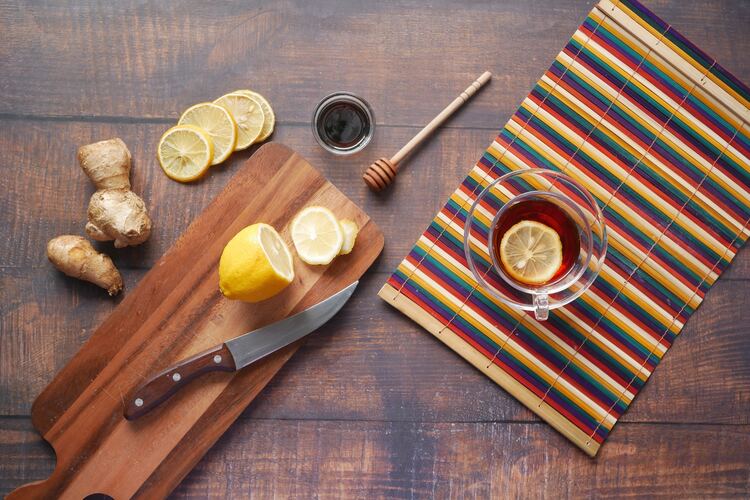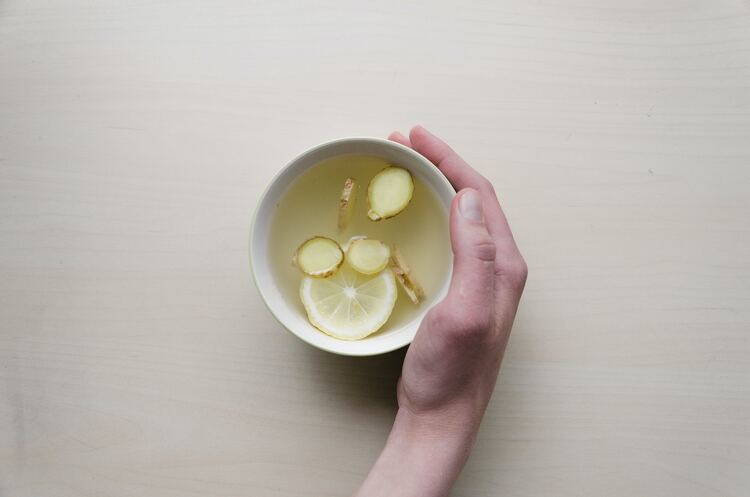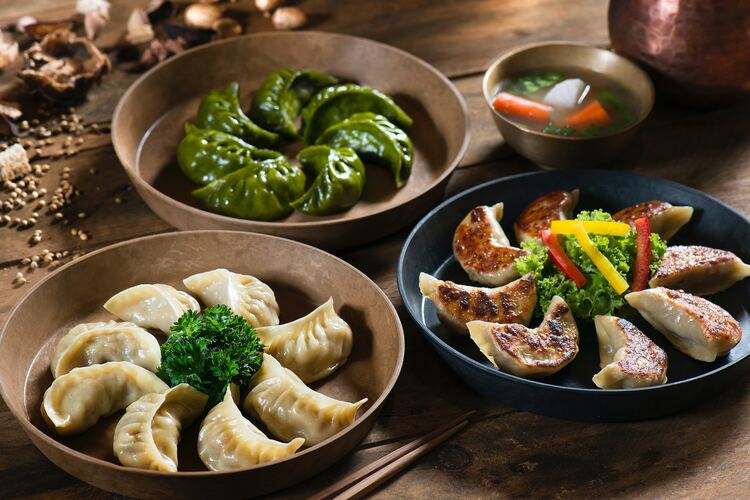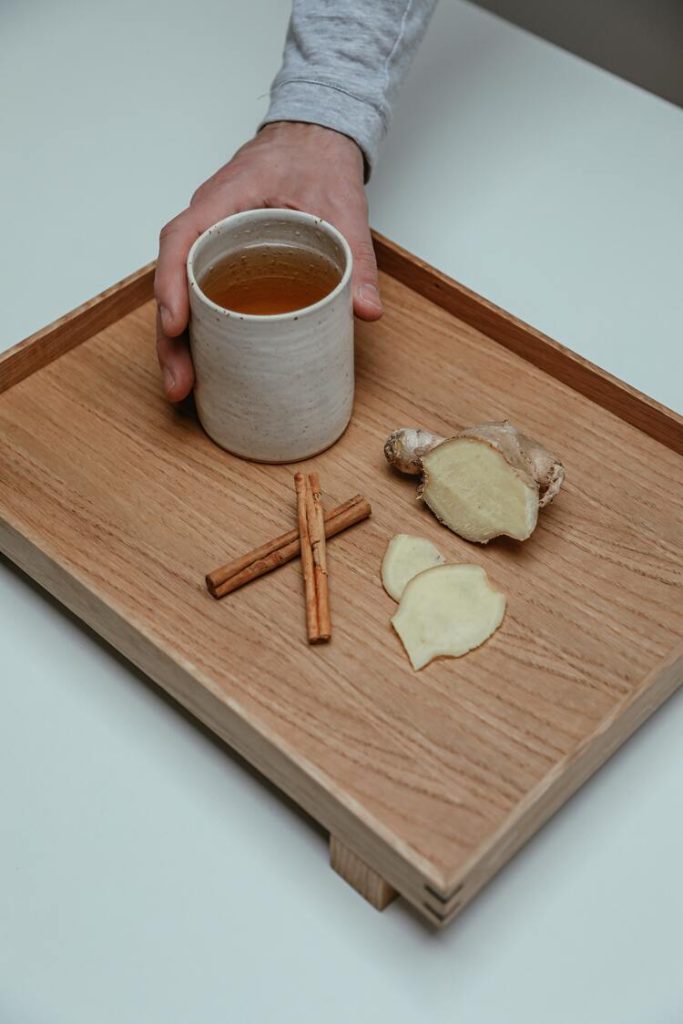What does ginger tea taste like? This spicy and flavorful tea has been enjoyed for centuries and is a popular beverage in many cultures. Ginger tea is made by steeping fresh or dried ginger root in hot water, and it can be enjoyed hot or cold.
One of the most distinctive features of ginger tea is its uplifting flavor. The taste of ginger is warm, spicy, and slightly sweet. The longer you steep the ginger root in hot water, the stronger the flavor. Some people describe the taste as similar to a combination of citrus, pepper, and earthy undertones. Ginger tea can be enjoyed independently or with a touch of honey or lemon to enhance the flavor.
If you enjoy this tea or want to learn more, join us as we explore its different aspects.
Please note: This article contains affiliate links, meaning I may earn a commission if you make a purchase by clicking a link. Of course, this comes at no extra cost to you and helps me keep offering readers solid information.

What is Ginger Tea?
If you’re looking for a comforting drink with a bit of a kick, ginger tea might be just what you need. Ginger tea is a beverage made by steeping fresh or dried ginger root in hot water. It has a distinct flavor and aroma that is well-known worldwide.
Ginger is a root belonging to the Zingiberaceae family, including turmeric and cardamom. Ginger contains several bioactive compounds, including gingerols and shogaols, responsible for its flavor and potential health benefits.
In addition to ginger, other ingredients can be added to ginger tea to enhance its flavor. Some common additions include lemon, honey, mint, cinnamon, cardamom, black pepper, allspice, nutmeg, cloves, citrus, maple syrup, milk, and various herbs and spices.
What Does Ginger Tea Taste Like?
If you’re wondering what ginger tea tastes like, you’re in for a treat. The taste of ginger tea can vary depending on the recipe and ingredients used, but here are some general characteristics to expect:
Spicy
Ginger is known for its spicy flavor, which is evident in ginger tea. The spiciness can be mild or intense, depending on how much ginger is used. Let’s clarify: ginger is not spicy in the same way as chili peppers or other hot spices. Some people describe its warm and pungent flavor as “spicy” due to the sensation it leaves in the mouth.
The spiciness of ginger is primarily attributed to a compound called gingerol. Gingerol is a natural oil that is found in fresh ginger root. When you consume ginger, the gingerol interacts with your taste buds and sensory receptors, creating a mildly hot or tingling sensation.
The intensity of the spiciness can vary depending on the ginger’s freshness, preparation method, and individual taste sensitivity.
Fresh ginger has a more intense flavor than dried or pre-packaged ginger. Cooking or heating ginger can reduce spiciness by breaking down some gingerol compounds.
Earthy
Ginger has a slightly earthy taste that is often described as woody or root-like. This flavor can be more or less pronounced depending on the recipe.
Citrus
Some ginger teas are enhanced with citrus elements, such as lemon or orange zest. These additions can add a bright and zesty citrus flavor that complements the spiciness of the ginger.
Sweetness
Ginger has a natural sweetness, which becomes more pronounced when steeped in hot water. However, ginger tea is generally not overly sweet and often relies on natural ginger sweetness rather than added sugars.
Warmth
Beyond the spiciness, ginger tea imparts a warming sensation, which can be particularly soothing, especially when consumed hot. This warming quality is why ginger tea is often considered a comforting and healing beverage.
Aromatic
Ginger tea has a pleasant aroma that combines the spicy, earthy, and citrusy notes, making it enticing to the senses.

How to Make Ginger Tea
Making ginger tea is easy and can be done with fresh or dried ginger. Here are a few ways to make the tea you can try at home.
Ginger Tea Recipe
To make ginger tea, you will need:
- 1-2 inches of fresh ginger root or 1-2 teaspoons of dried ginger
- 2 cups of water
- Lemon, honey, mint, cinnamon, cardamom, black pepper, allspice, nutmeg, cloves, maple syrup, milk, or any other herbs or spices you like (optional)
Instructions:
- Peel and slice the fresh ginger root, or use dried ginger.
- Bring 2 cups of water to a boil in a pot.
- Add the ginger to the pot and reduce the heat to low.
- Let the ginger simmer for 10-15 minutes.
- Strain the tea into a mug or teapot.
- Add lemon, honey, mint, cinnamon, cardamom, black pepper, allspice, nutmeg, cloves, maple syrup, milk, or other herbs or spices you like to taste.
Ginger Tea Bags
If you prefer to use tea bags, you can still easily make ginger tea. Here’s how:
To make ginger tea using tea bags, you will need:
- Ginger tea bags
- Boiling water
- Lemon, honey, mint, cinnamon, cardamom, black pepper, allspice, nutmeg, cloves, maple syrup, milk, or any other herbs or spices you like (optional)
Instructions:
- Boil 2 cups of water in a pot or kettle.
- Place a ginger tea bag in a mug or teapot.
- Pour the boiling water over the tea bag.
- Let the tea steep for 5-10 minutes.
- Remove the tea bag and add lemon, sweeteners, milk, spices or herbs to taste.
Enjoy your homemade ginger tea!

Ginger Tea Blends
When it comes to ginger tea, you can try many different blends to enhance the flavor and add variety to your cup. You can make your blend using fresh ingredients or acquire a pre-packaged blend from a supermarket or online retailer. Here are a few popular blends to consider:
Lemon Ginger Tea
Lemon and ginger are a classic combination that works well together in tea. You can make this blend by adding a slice of fresh lemon to your ginger tea or using lemon juice to flavor the tea. The lemon adds a bright, citrusy note that complements the spicy ginger flavor.
Honey Ginger Tea
For a touch of sweetness, try adding honey to your ginger tea. Honey and ginger are natural remedies for sore throats and coughs, so this blend is perfect for when you’re under the weather. Add a dash of cinnamon to this blend for extra warmth and flavor.
Turmeric Ginger Tea
Turmeric is another spice that pairs well with ginger. Turmeric has anti-inflammatory properties and is often used in Ayurvedic medicine to treat various ailments. Add a pinch of turmeric to your ginger tea to make this blend, and let it steep for a few minutes before drinking.
Ginger Mint Tea
You might enjoy adding fresh leaves to your ginger tea if you like mint tea. The mint adds a refreshing flavor that compliments the spicy ginger. You can also add a touch of honey to this blend for sweetness.
Ginger Green Tea
Try blending ginger with green tea for a lighter, more delicate ginger tea. Green tea has a mild flavor that won’t overpower the ginger and boosts antioxidants. You can use fresh ginger or ginger tea bags for this blend.
Experiment with different flavors and spices to find your perfect cup.
Food Pairings
Ginger tea is a versatile beverage that can be enjoyed independently or with various foods. Here are some food pairing suggestions to enhance your tea-drinking experience:
- Sweet Treats: Ginger tea pairs well with sweet treats like cookies, cakes, and pastries. The spicy flavor of the tea complements the sweetness of the dessert, creating a perfect balance of flavors.
- Savory Snacks: The tea goes well with savory snacks like cheese and crackers, hummus and pita chips, or even popcorn. The spiciness of the tea can help cut through the richness of the snacks, creating a refreshing and satisfying flavor combination.
- Fruit and Cheese Platters: If you want a more sophisticated pairing, try serving ginger tea with a fruit and cheese platter. The spiciness of the tea enhances the flavors of the cheese and fruit, creating a complex and delicious taste.
- Asian Cuisine: This tea is a staple in many Asian cultures and pairs well with Asian cuisine, like sushi, stir-fry, and dumplings. The spiciness of the tea complements the flavors of the food, creating a harmonious and delicious meal.
- Soups and Stews: Ginger tea can also be paired with soups and stews, especially those with spicy or bold flavors. The tea can help enhance the flavors of the soup or stew, creating a warming and comforting meal.
Experiment with different pairings to find your perfect combination!

Health Benefits of Ginger Tea
Ginger tea is not only a delicious and refreshing beverage, but it also has numerous health benefits. Here are some of its health benefits:
Anti-Inflammatory Properties
Ginger contains compounds called gingerols and shogaols that have anti-inflammatory properties. Drinking ginger tea regularly can help reduce inflammation and benefit people with conditions such as arthritis.
Digestive Benefits
Ginger tea can also aid digestion by reducing gas, bloating, and heartburn. It can also help relieve nausea and vomiting, making it an excellent choice for people who suffer from morning sickness.
Pain Relief
Ginger has natural pain-relieving properties, making it an effective remedy for headaches and menstrual cramps. Drinking ginger tea regularly can help reduce the severity and frequency of these types of pain.
Cold and Flu Relief
Ginger tea is a popular home remedy for cold and flu symptoms. It can help relieve congestion, soothe a sore throat, and reduce fever. Drinking ginger tea can also boost your immune system, allowing you to fight infections.
Heart Health
Ginger tea can help lower cholesterol levels and high blood pressure, reducing your risk of heart disease. It can also help regulate blood sugar and insulin levels, making it beneficial for people with diabetes.
Anticancer and Antimicrobial Properties
Ginger has been shown to have anticancer and antimicrobial properties, making it a promising natural remedy for cancer and infectious diseases. However, more research is needed to understand these benefits fully.
While ginger tea is generally considered safe for most people, it’s always a good idea to talk to your doctor before consuming it regularly, especially if you have any underlying health conditions.

Storing Ginger Tea
When it comes to storing ginger tea, there are a few things you should keep in mind to ensure that it stays fresh and flavorful. And, to clarify, we are referring to dried ginger or a dried, pre-packaged blend. Here are some tips to help you store your ginger tea properly:
- Store your ginger tea in an airtight container: This will help prevent air and moisture from getting in and affecting the flavor of your tea. You can use a glass jar with a tight-fitting lid or a resealable plastic bag.
- Keep your ginger tea in a cool, dry place. Exposure to heat and humidity can cause your tea to go stale or develop mold. Store your tea in a pantry or cupboard away from direct sunlight and heat sources.
- Use your ginger tea within a reasonable amount of time: While ginger tea can last for several months if stored properly, it’s best to use it within a few weeks to ensure that it’s at its freshest.
- Avoid storing your ginger tea in the refrigerator: While some people may think that storing tea in the fridge will help it last longer, this can actually cause the tea to absorb moisture and odors from other foods in your fridge.
By following these simple tips, you can help ensure that your ginger tea stays fresh and flavorful for as long as possible.
Buying Recommendations
When it comes to ginger tea, there are a lot of different products to choose from. Here are our top recommendations (which were not easy to down-select).
Twinings Lemon & Ginger Herbal Tea


VAHDAM, Organic Turmeric Ginger Herbal Tea Bags

Yogi Tea – Ginger Tea Variety Pack Sampler

Traditional Medicinals Organic Ginger Herbal Leaf Tea

Ginger tea brings back a lot of good childhood memories. My mom used to prepare it to drink before bed. I hope you have enjoyed the article and learned something new.
To you, what does ginger tea taste Like?
More About Herbal Tea
What Does Peppermint Tea Taste Like?
What Does Mint Tea Taste Like?
What Does Lemon Balm Tea Taste Like?
What Does Chamomile Tea Taste Like?
What Does Lavender Tea Taste Like?